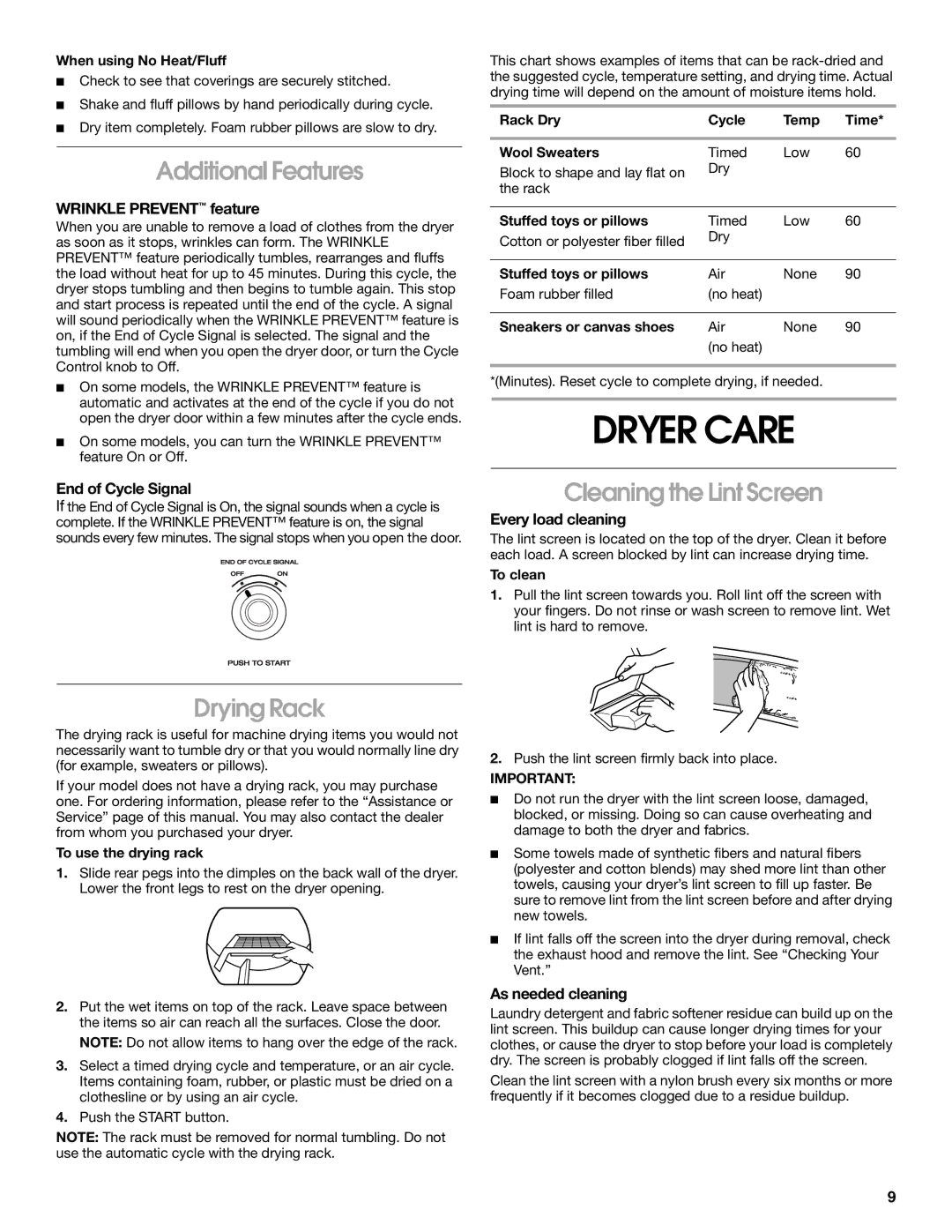
When using No Heat/Fluff
■Check to see that coverings are securely stitched.
■Shake and fluff pillows by hand periodically during cycle.
■Dry item completely. Foam rubber pillows are slow to dry.
Additional Features
WRINKLE PREVENT™ feature
When you are unable to remove a load of clothes from the dryer as soon as it stops, wrinkles can form. The WRINKLE PREVENT™ feature periodically tumbles, rearranges and fluffs the load without heat for up to 45 minutes. During this cycle, the dryer stops tumbling and then begins to tumble again. This stop and start process is repeated until the end of the cycle. A signal will sound periodically when the WRINKLE PREVENT™ feature is on, if the End of Cycle Signal is selected. The signal and the tumbling will end when you open the dryer door, or turn the Cycle Control knob to Off.
■On some models, the WRINKLE PREVENT™ feature is automatic and activates at the end of the cycle if you do not open the dryer door within a few minutes after the cycle ends.
■On some models, you can turn the WRINKLE PREVENT™ feature On or Off.
End of Cycle Signal
If the End of Cycle Signal is On, the signal sounds when a cycle is complete. If the WRINKLE PREVENT™ feature is on, the signal sounds every few minutes. The signal stops when you open the door.
Drying Rack
The drying rack is useful for machine drying items you would not necessarily want to tumble dry or that you would normally line dry (for example, sweaters or pillows).
If your model does not have a drying rack, you may purchase one. For ordering information, please refer to the “Assistance or Service” page of this manual. You may also contact the dealer from whom you purchased your dryer.
To use the drying rack
1.Slide rear pegs into the dimples on the back wall of the dryer. Lower the front legs to rest on the dryer opening.
2.Put the wet items on top of the rack. Leave space between the items so air can reach all the surfaces. Close the door.
NOTE: Do not allow items to hang over the edge of the rack.
3.Select a timed drying cycle and temperature, or an air cycle. Items containing foam, rubber, or plastic must be dried on a clothesline or by using an air cycle.
4.Push the START button.
NOTE: The rack must be removed for normal tumbling. Do not use the automatic cycle with the drying rack.
This chart shows examples of items that can be
Rack Dry | Cycle | Temp | Time* |
|
|
|
|
Wool Sweaters | Timed | Low | 60 |
Block to shape and lay flat on | Dry |
|
|
|
|
| |
the rack |
|
|
|
|
|
|
|
Stuffed toys or pillows | Timed | Low | 60 |
Cotton or polyester fiber filled | Dry |
|
|
|
|
| |
|
|
|
|
Stuffed toys or pillows | Air | None | 90 |
Foam rubber filled | (no heat) |
|
|
|
|
|
|
Sneakers or canvas shoes | Air | None | 90 |
| (no heat) |
|
|
*(Minutes). Reset cycle to complete drying, if needed.
DRYER CARE
Cleaning the Lint Screen
Every load cleaning
The lint screen is located on the top of the dryer. Clean it before each load. A screen blocked by lint can increase drying time.
To clean
1.Pull the lint screen towards you. Roll lint off the screen with your fingers. Do not rinse or wash screen to remove lint. Wet lint is hard to remove.
2.Push the lint screen firmly back into place.
IMPORTANT:
■Do not run the dryer with the lint screen loose, damaged, blocked, or missing. Doing so can cause overheating and damage to both the dryer and fabrics.
■Some towels made of synthetic fibers and natural fibers (polyester and cotton blends) may shed more lint than other towels, causing your dryer’s lint screen to fill up faster. Be sure to remove lint from the lint screen before and after drying new towels.
■If lint falls off the screen into the dryer during removal, check the exhaust hood and remove the lint. See “Checking Your Vent.”
As needed cleaning
Laundry detergent and fabric softener residue can build up on the lint screen. This buildup can cause longer drying times for your clothes, or cause the dryer to stop before your load is completely dry. The screen is probably clogged if lint falls off the screen.
Clean the lint screen with a nylon brush every six months or more frequently if it becomes clogged due to a residue buildup.
9
